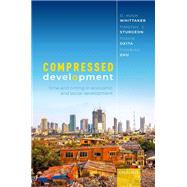- ISBN: 9780198744948 | 0198744943
- Cover: Hardcover
- Copyright: 11/9/2020
Compressed Development examines how experiences of economic and social development have changed and are continuing to change. What used to be clear development 'stages' in the 'late development' era now unfold simultaneously, or out of sequence. States and markets, organizations and technologies co-evolve more rapidly and supra-nationally, diminishing some of the levers of state control and creating new opportunities and challenges for policymakers, businesses, and civil society.
Development and integration into the global economy has always been shaped by prevailing geopolitical, institutional, and ideological forces. This book details how the post-1980s era has unleashed a set of political, institutional, organizational, and technological forces that contrast sharply with the post-war decades. All this has intensified compression, resulting in partial or 'thin' industrialization even in successful developers; disconnections between technological, economic, and social upgrading; and new policy challenges in a context of actor proliferation. Compressed developers may face 'premature ageing' and 'double burdens', such as obesity and type 2 diabetes at the same time as communicable diseases. Even countries that have grown with unprecedented speed risk becoming mired in a 'middle-income trap' while others remain stalled or disconnected. Through the lens of time and timing the book offers a unique perspective on post-late development and prospects for the developmental state.
Development and integration into the global economy has always been shaped by prevailing geopolitical, institutional, and ideological forces. This book details how the post-1980s era has unleashed a set of political, institutional, organizational, and technological forces that contrast sharply with the post-war decades. All this has intensified compression, resulting in partial or 'thin' industrialization even in successful developers; disconnections between technological, economic, and social upgrading; and new policy challenges in a context of actor proliferation. Compressed developers may face 'premature ageing' and 'double burdens', such as obesity and type 2 diabetes at the same time as communicable diseases. Even countries that have grown with unprecedented speed risk becoming mired in a 'middle-income trap' while others remain stalled or disconnected. Through the lens of time and timing the book offers a unique perspective on post-late development and prospects for the developmental state.






